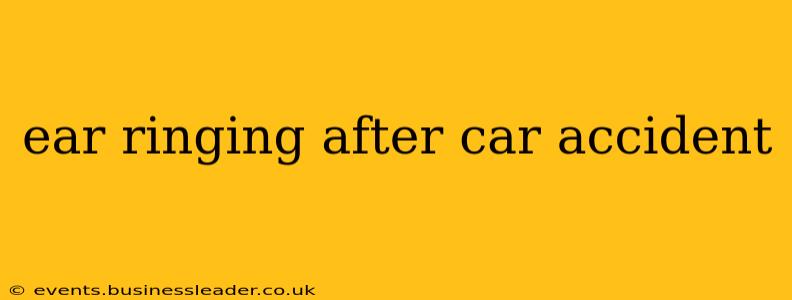Experiencing a ringing in your ears after a car accident is a serious concern. This condition, known as tinnitus, is often associated with head injuries, even minor ones, resulting from the sudden impact and jarring forces involved in a collision. While many cases resolve themselves, others require professional medical intervention. This comprehensive guide explores the connection between car accidents and tinnitus, offering insight into its causes, symptoms, diagnosis, and treatment options.
What Causes Ear Ringing After a Car Accident?
The primary cause of tinnitus following a car accident is often related to the trauma experienced by the inner ear and auditory nerve. The intense impact can cause:
- Temporary Disruption: Minor trauma might lead to temporary inflammation or disruption of the delicate structures within the ear, causing temporary tinnitus.
- Inner Ear Damage: More severe accidents can result in damage to the hair cells in the cochlea, responsible for converting sound vibrations into electrical signals sent to the brain. This damage can be permanent.
- Auditory Nerve Damage: The auditory nerve transmits these signals to the brain. Damage to this nerve can also contribute to persistent tinnitus.
- Temporal Bone Fracture: In severe accidents, a fracture of the temporal bone (the bone surrounding the ear) can directly damage the inner ear structures and lead to long-term tinnitus.
- Concussion or Traumatic Brain Injury (TBI): Even without direct ear damage, a concussion or TBI can cause tinnitus due to the brain's altered processing of auditory signals.
Is Tinnitus After a Car Accident Always Permanent?
Not necessarily. While some cases of post-accident tinnitus are permanent, many are temporary. The duration and severity depend on the extent of the ear injury and individual healing capabilities. Many individuals experience a gradual reduction or complete resolution of their tinnitus over time. However, it's crucial to seek medical attention to determine the cause and severity of your condition.
How is Tinnitus Diagnosed After a Car Accident?
Diagnosing tinnitus after a car accident involves a thorough examination by an audiologist or ENT specialist. The process might include:
- Physical Examination: A check for any visible ear injuries or signs of temporal bone fracture.
- Hearing Test (Audiometry): This test assesses the range and sensitivity of your hearing.
- Tinnitus Assessment: Specific tests measure the loudness, pitch, and location of the tinnitus.
- Imaging Studies (if necessary): CT scans or MRIs may be used to detect any underlying fractures or damage.
What Treatments are Available for Tinnitus After a Car Accident?
Treatment options for tinnitus vary depending on its cause and severity. Some common approaches include:
- Sound Therapy (White Noise Machines, etc.): These devices help mask the tinnitus sound, making it less noticeable.
- Cognitive Behavioral Therapy (CBT): CBT helps individuals cope with the psychological impact of tinnitus, reducing stress and anxiety.
- Hearing Aids (if hearing loss is present): Addressing underlying hearing loss can sometimes alleviate tinnitus.
- Medication: In some cases, medication might be prescribed to manage underlying conditions or alleviate tinnitus symptoms. However, there is no single cure-all drug for tinnitus.
- Tinnitus Retraining Therapy (TRT): This comprehensive therapy helps the brain adapt to the perception of tinnitus.
Can I Claim Compensation for Tinnitus After a Car Accident?
If your tinnitus resulted from a car accident caused by someone else's negligence, you might be able to claim compensation for your medical expenses, lost wages, and pain and suffering. Consult with a personal injury lawyer to understand your legal rights.
How Long Does Tinnitus Last After a Car Accident?
The duration of tinnitus varies greatly, from a few days to a lifetime. Factors influencing duration include severity of injury, underlying health conditions, and effectiveness of treatment.
What are the Long-Term Effects of Tinnitus After a Car Accident?
The long-term effects can include persistent ringing in the ears, difficulty concentrating, sleep disturbances, anxiety, and depression. Early intervention and appropriate management are crucial to mitigate these long-term impacts.
This information is for general knowledge and does not constitute medical advice. Always consult with a healthcare professional for diagnosis and treatment of any medical condition. If you are experiencing tinnitus after a car accident, seek medical attention immediately.
